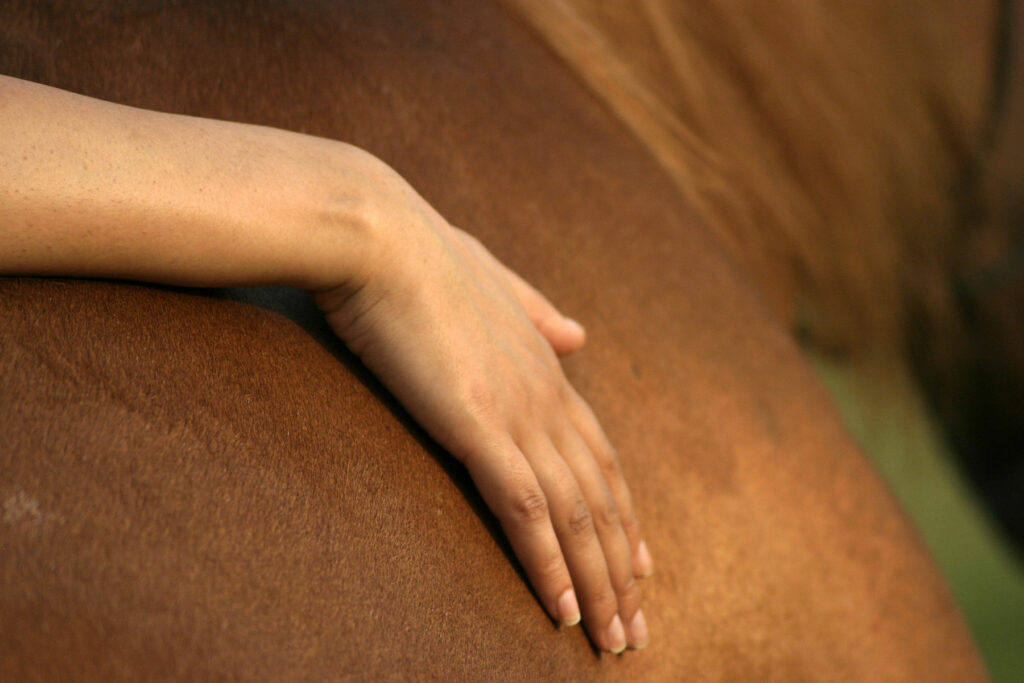Did you know that Honey Lake Clinic offers an equine program in Florida for mental health treatment at our resort-like accommodations in Greenville? We believe in the power of equine-assisted therapy and provide several types of equine therapy to our patients. Our equine therapy in Florida folds into our faith-based approach to mental health care. Contact our team online or call 888.428.0562 to learn more.
About Equine Therapy
Horses are used in several therapies to assist people experiencing physical, mental, or emotional difficulties. At Honey Lake Clinic, equine-assisted therapy can be utilized in conjunction with other forms of therapy as a part of your overall treatment program.
Equine therapy has become a widely used therapeutic method for treating a variety of psychological, mental, and mood disorders—even addiction. Several different types of equine treatments are popular in practice around the world. Each has aims that correspond well with each patient’s needs and conditions.
Types of Equine Treatment
Here is a list of five popular types of equine therapy and their applications.
Therapeutic Horseback Riding
Therapeutic horseback riding is typically taught by a riding instructor or horseman who teaches you how to control a horse while riding. It’s used as an exercise to improve the following:
- Coordination
- Balance
- Posture
- Muscle tone
- Confidence
- Well-being
The individual is typically taught how to work with the horse on the ground and ride it.
Hippotherapy
Hippotherapy is similar to therapeutic horseback riding but typically involves an occupational therapist, physiotherapist, or speech and language therapist. The horse is controlled by a handler and led through several different gaits, tempos, cadences, and directions. The other horse movements challenge you to use different postural responses, strengthening the rider’s muscles.
Equine-Assisted Learning (EAL)
Through interactions with horses in EAL programs, participants develop a heightened self-awareness, essential to reveal behavior patterns and give them the chance to think in a new way. Participants gain self-confidence by learning how to work with such large and powerful creatures and how non-verbal communication might affect others.
Equine-Assisted Psychotherapy (EAP)
EAP is the use of horses to treat psychological problems. It is not the same thing as therapeutic riding or hippotherapy. Some programs may incorporate riding and vaulting, but most utilize groundwork with horses, such as grooming, feeding, and ground exercises. Mental health professionals use horses to help patients learn about themselves and discuss feelings, patterns, and behaviors. The goal is to assist in social, emotional, cognitive, and behavioral ways.
Less-Common Therapies
Other forms of equine therapy include interactive vaulting, therapeutic carriage driving, and equine-assisted activities (EAA), which include horse grooming, stable management, shows, parades, and demonstrations.
What to Expect from Our Equine-Assisted Therapy in Florida
Several nuances within the equine therapy program at Honey Lake Clinic differentiate our program from others. Here are a few to consider:
Spiritual truths and principles are applied as patients work towards a point of connection with the animal. This aids you in drawing parallels between your circumstances and your relationship with the horse.
- Techniques from different models in equine therapy are employed.
- Our patients can participate in a horse’s rehabilitation at Honey Lake Clinic.
- Our equine therapy program can include work with larger draft horses. You will benefit significantly from connecting with such powerful yet gentle creatures.
- Our equine therapy program is available to most patients who desire to try this form of therapy, even if they have no horse experience.
Equine therapy, in correlation with other forms of treatment and education, can offer you a deeper awareness of yourself, your feelings, behaviors, and interactions with others.
Engage in Equine Therapy in Florida at Honey Lake Clinic
Honey Lake Clinic offers a faith-informed model, experienced staff, licensed professional caregivers, and individualized treatment in a beautiful, tranquil 1300-acre lakeside setting. Contact our team online or call 888.428.0562 to learn more about our resort-like accommodations, Biblical worldview, and Christian mental health treatment approach.
